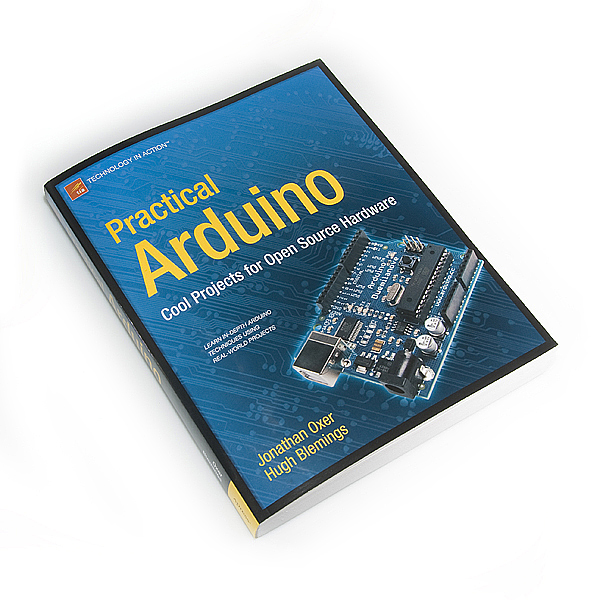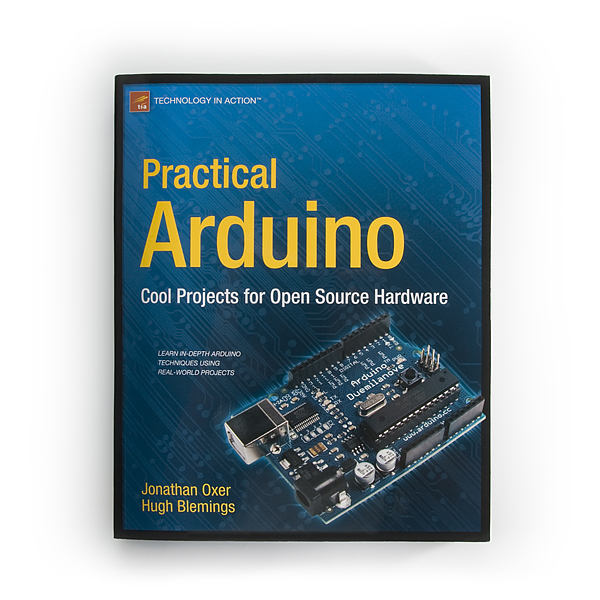Practical Arduino
Create your own Arduino-based designs, gain in-depth knowledge of the architecture of Arduino, and learn the user-friendly Arduino language all in the context of practical projects that you can build yourself at home. Get hands-on experience using a variety of projects and recipes for everything from home automation to test equipment.
Practical Arduino: Cool Projects for Open Source Hardware demonstrates a variety of Arduino techniques in a practical context, giving you an opportunity to learn how the theory and reference material applies to real-world projects.
This book provides more than just a simple series of steps to follow - it tells you why the circuit was designed that way in the first place. You won't just be a color-by-numbers painter; you'll learn to be a true hardware craftsman and artist, able to conceptualize, design, and assemble your own creations. Take these projects as inspiration and examples of applying a variety of handy techniques, and then adapt them to suit your own requirements.
A few of the projects you'll encounter:
- Appliance Remote Control
- Time-Lapse Camera Controller
- Virtual USB Keyboard
- Security/Automation Sensors
- Online Thermometer
- Speech Synthesis
- Weather Station Receiver
- Vehicle Telemetry Platform
Info:
- Author: Jonathan Oxer & Hugh Blemings
- Publisher: Apress
- Paperback: 500 pages
- ISBN-10: 1430224770
- ISBN-13: 978-1430224778
Practical Arduino Product Help and Resources
Core Skill: Programming
If a board needs code or communicates somehow, you're going to need to know how to program or interface with it. The programming skill is all about communication and code.
Skill Level: Rookie - You will need a better fundamental understand of what code is, and how it works. You will be using beginner-level software and development tools like Arduino. You will be dealing directly with code, but numerous examples and libraries are available. Sensors or shields will communicate with serial or TTL.
See all skill levels
Comments
Looking for answers to technical questions?
We welcome your comments and suggestions below. However, if you are looking for solutions to technical questions please see our Technical Assistance page.
Customer Reviews
No reviews yet.



If I had to choose between this book and The Arduino Cook Book, which would you recommend? I am new to Arduino, I did buy the Getting Started With Arduino from Make, but need some more examples and explanation.
would this book be good for someone whos knows how to use arduino but isnt a pro?
Yes.
I am just finishing it. I would say it is well worth it if, like me, you have messed around with this stuff a bit but have not mastered it. Even though I am not building any of the projects discussed, each chapter provides some insight that is useful to what I am working on or thinking about. One caveat. I used it to construct a circuit (the resistor ladder). It didnt work. I thought it was me. Turns out the material in their book is wrong and the corrections are posted on their web site. So I guess I will double check on anything else I build from that book.
Do any of these books go through the parts necessary to breadboard the Atmega 328 chip?
The Arduino Web site (http://www.arduino.cc) describes how to do this - and even how to program your breadboard Atmega with your Arduino as an ISP :) Check the Hacking section of the site for details.
We also have a tutorial on our site as well. There are also numerous others on the web as well. You will find a lot for it.
But is there a way to know what parts are required to do the projects in this book?
typically, yes. this book specifically will show you what the part is and where to get it.
I did and I really like it. I am focusing on the OBD-II project. Its easy to follow and has lots of good practical advice and explanations of why various design points were chosen...at least the parts I have read thus far.
Anyone buy and like this book?